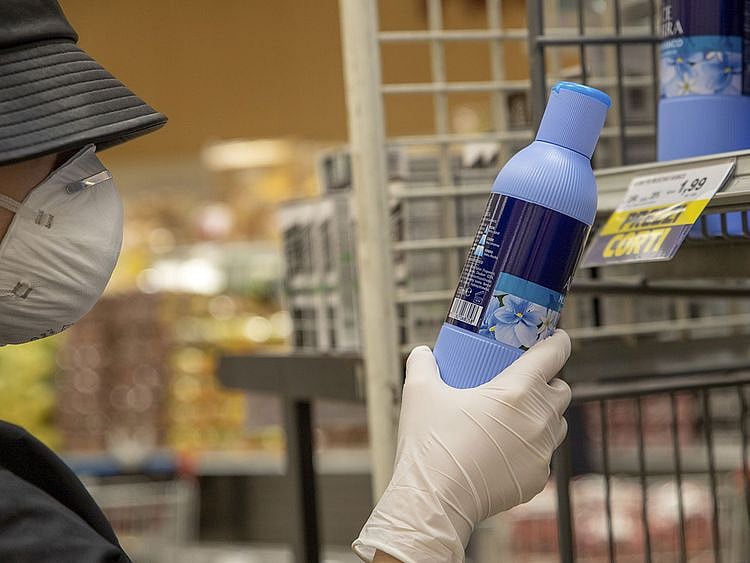This pandemic isn’t strange anymore
I simply turn toward him and try to smile with my eyes

I cannot tell you how many times I did not see the yeast before I noticed it was there again.
When the first stay-at-home orders emptied grocery store aisles, I stocked up like everyone else, anxiously filling my cart with anything that looked shelf-stable and at least theoretically edible, even if I would have never brought it home before: frozen frenched green beans, tinned sardines, bags of dried legumes.
Newly minted home cooks
As the initial panicked cacophony faded into the quieter hum of mere dread, my purchases mostly grew familiar again. Still, some things were missing, most of them infrastructural victims, we know now, of issues with packaging. For months, whenever I ventured out of the house, I would diligently check a phone app whose users reported what was available where. Toilet paper was notoriously hard to come by, of course. Pasta, likewise, was scarce, presumably snapped up by newly minted home cooks who didn’t know what else to make.
Yeast was absent, too, and it seemed to stay that way even as other goods repopulated the shelves. One colleague acquired a whole pound of the stuff from a beleaguered downtown pizzeria. Many more acquaintances and friends became parents to bubbling sourdough starters, fussing over them as they later would newborn puppies. I, for my own part, carefully conserved a four-ounce jar of Fleishmann’s active dry that I had bought months before everything went to hell, unsure how long its contents would last or how long they would stay viable. Each time I stirred it into lukewarm water, I would watch anxiously, waiting for neuronal ripples to bloom on the surface as it came to life.
We need signposts
Frustrating as all of this was, it also offered a paradoxical comfort. So long as yeast — or hand sanitiser, or paper towels, or whatever we were looking for — was missing from the stores we sped through, we had tangible evidence that something was off in a way that could be remedied. When things are bad, we need signposts to tell us that the abnormal is abnormal, if only because they also promise a way out. They reassure in the way of lights on the landing strip of a regional airport, showing us that this turbulence will pass, that solid ground is in sight. There was no denying the pandemic’s mounting horrors, but the idea that yeast might return suggested normality might, too.
How peculiar, then, to find it back in stock so long after I stopped looking for it. If I at first failed to spot the yeast in the baking aisle even after it reappeared, it may have been because I didn’t want to see it, even if I did want to watch balls of dough balloon on my kitchen counter. I had longed to find it, but not now, not like this. To come across all those jars and packets before things had really improved was to confront, unavoidably, that the abnormal is normal now.
What is strangest today is that our initial markers of strangeness have fallen away, even as the strange situation they once demarcated remains substantially the same. This is the trouble with metaphors: They make the world navigable, which means that when they fail us, we sometimes forget where we were going. I no longer fear, as I once did, that our food supply chain might shatter at any moment. I have pushed the 10-pound bag of black beans and the 25-pound sack of rice deeper into our storage closet to await some more crippling catastrophe. But when I visit the grocery store now, I still wear the masks that fogged my glasses when I bought those supplies. And when I check the news, the death totals still climb every day.
Follow arrows on the grocery store floor
This is where we are, then: To see the yeast, whatever the yeast is for you, is to resign yourself to stasis, to know that this is the way things are going to be. We have learnt to live with the pandemic by accustoming ourselves to the reality that we will eventually be able to live a little better, but not quite as well as we once did. We have yeast again, but we follow arrows on the grocery store floor to reach it. We can make bread again, but we can’t break it with anyone. We do not spend time with our friends so much as we hover, phantasmatic, on their porches and in their backyards, our voices muffled into moans by masks, distance, the wind.
At the park, my friends’ toddler chases me in circles around the steady trunk of an ancient willow oak, a tree almost as old as our ailing nation, its leaves splayed out above us like a pianist’s fingers. Not so long ago, I might have caught him and lifted him toward the canopy. Instead, I stay a few paces ahead, fleeing whenever he gets close, loving him too much to trust that his mask, on which a toothy dinosaur grins, will keep him safe. “Where are we running to, Jacob?” he shouts after me, laughing with every syllable in the way children can.
In another time, the one in which I could have put him on my shoulders, I might have woven a fantastical story: our path a rising rainbow, our destination a shimmering palace. But this moment, the one in which I must always stay ahead, is still too strange for the fantastical. My imagination failing me, I simply turn toward him and try to smile with my eyes. I cannot bear to tell him that we are running in place.
Robb Hill is a columnist
Washington Post
Sign up for the Daily Briefing
Get the latest news and updates straight to your inbox
Network Links
GN StoreDownload our app
© Al Nisr Publishing LLC 2026. All rights reserved.